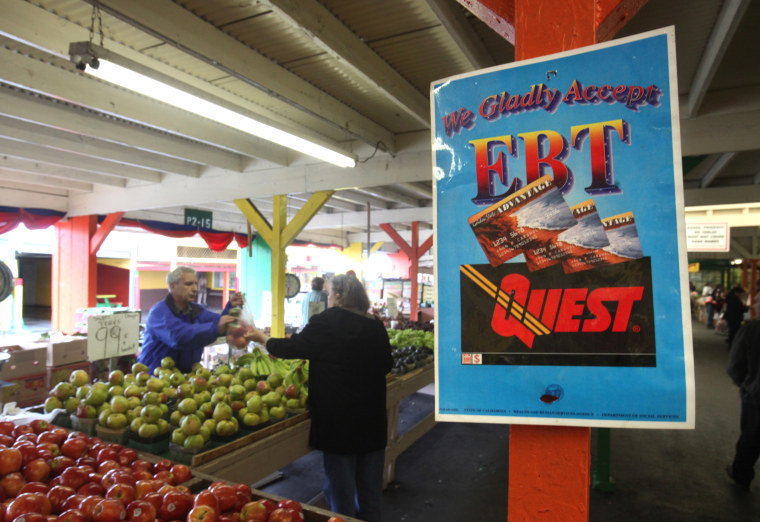Being poor is easy, especially when you're not. Or at least that seems to be the lesson from a Republican House aide's experiment with the Food Stamp Challenge.
On Tuesday, Donny Ferguson—the communications director and agriculture policy adviser for Texas Rep. Steve Stockman—"debunked" the claim that poor families would go hungry if Congress cut billions in funding for the Supplemental Nutrition Assistance Program (SNAP), according to a statement by Stockman's office. In order to prove his point, Ferguson spent a week living off a food budget of only $31.50, roughly a quarter of the $133.42 which the average food stamp recipient receives in a month.
“I wanted to personally experience the effects of the proposed cuts to food stamps," said Ferguson in the statement. "I didn’t plan ahead or buy strategically, I just saw the publicity stunt and made a snap decision to drive down the street and try it myself. I put my money where my mouth is, and the proposed food stamp cuts are still quite filling."
Ferguson's self-imposed $31.50 food budget emulated a similar challenge undertaken by 26 House Democrats last week. But those lawmakers took on the challenge as a way of protesting the $20.5 billion in cuts to SNAP benefits currently being debated in the House.
"Feeding a family on SNAP is difficult as it is, and it would become virtually impossible if these cuts are implemented," said Rep. Doris Matsui, D-Calif., in a statement. "That is why I am taking the SNAP Challenge to promote awareness for hunger and highlight the importance of this critical program."
But according to Ferguson, there's plenty of room for cuts.
“Not only did I buy a week’s worth of food on what Democrats claim is too little, I have money left over," he said. "Based on my personal experience with SNAP benefit limits we have room to cut about 12% more.”
New York City Coalition Against Hunger executive director Joel Berg, who has undergone similar challenges twice, called Ferguson's claims "preposterous."
"If he'd like to swap lives with a food stamp recipient for a year, I can find 47 million people who would like to take him up on that offer," he said. The problem is that living on a SNAP-level budget does not provide any sense of what it's truly like to rely on the program.
"The longer you do this, the harder it is to do, the harder it is to make time to shop, and the further you go into debt," said Berg. SNAP benefits are allotted monthly, and the average recipient usually runs low on funds after the second week.
In part, that's because the average recipient isn't young, healthy, single and employed. About 47% of all households receiving SNAP benefits include children, according to the USDA [PDF]. Additionally, 16.5% of households on food stamps include elderly individuals, and 20% of households include disabled people. Ferguson's press release gives no indication that he's feeding anyone other than himself.
"If he had kids, would he be proud feeding his family with what he bought? I suspect not," said Berg, who noted that Ferguson's shopping list included no fresh fruit or vegetables. "He seems to be promoting a pretty unhealthy diet, a strong recipe for heart disease and diabetes."
Ferguson posted online a photo of his shopping receipts along with a spreadsheet of a meal-by-meal breakdown of what he ate during the week. Included in his shopping list were two liters of root beer, a large box of popsicles, eight cups of applesauce and two cans of refried beans.
“I could have bought cheaper vegetables instead of prepared red beans and rice, but I like red beans and rice," said Ferguson in his statement. "Folks aren’t buying fast food instead of vegetables because of benefit limits, they’re buying fast food because fast food tastes great and vegetables taste like vegetables.”
